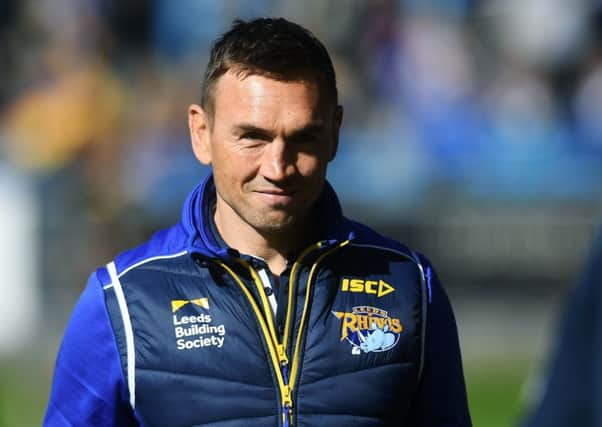Why money is not everything when it comes to sport screen deals


“What we won’t realise is the amount of kids at home who have been inspired by these last couple of weeks and may pick up a rugby ball on the back of this. And that’s what it’s about: getting more playing.”
Sinfield was speaking to The Yorkshire Post’s very own Dave Craven about the potential impact the England versus New Zealand series being screened on terrestrial television could have on the growth of the game.
Advertisement
Hide AdAdvertisement
Hide AdThe numbers so far are encouraging, which is great news for rugby league. For starters, 1.7 million people watched last weekend’s second Test on BBC2.
Yesterday’s final Test, played in front of a near sell-out at Elland Road in Leeds, would have drawn similar.
They are huge numbers for three Tests contested across the north of England and fair play to the BBC, a national broadcaster, for beaming live images of a predominently northern game into households the length and breadth of the country.
In terms of an advert for the game, showcasing it to impressionable youngsters, there is nothing better than free-to-air television coverage.
Advertisement
Hide AdAdvertisement
Hide AdThink of the millions of youngsters who will have been inspired by the emotional adventure Gareth Southgate’s footballers took them on this summer.
Every England World Cup game broadcast live on BBC or ITV with 25 million people tuning in to every kick.
I was even close to getting my four-year-old son addicted to the football this past summer, until after 10 minutes the realisation dawned that we were not watching Peppa Pig and Daddy had to retreat to the kitchen.
But the more exposure I can get him and his younger sister to live sport, the more chances they have to be inspired.
Advertisement
Hide AdAdvertisement
Hide AdRegrettably, The Yorkshire Post salary may stretch to a yacht moored off the Bahamas, but it does not bend enough to allow me a monthly subscription to Sky Sports, BT Sport, Premier Sports or the new players on the block now like Eleven Sports and Amazon Prime, who have sports broadcast contracts.
So over the course of the last few months alone I have been unable to sit and watch the Ryder Cup or the Open Championship with my son, missing out on the chance to introduce him to the drama of golf’s greatest competitions.
We missed the England cricket team’s destruction of India while their first Test victory over Sri Lanka was monitored only via internet updates.
Lord’s knows when my children, or any children with without Sky or BT for that matter, will ever see a ball being bowled in cricket.
Advertisement
Hide AdAdvertisement
Hide AdI’m told it’s via a concept called ‘The Hundred’ in a few years time, but our cricket correspondent, Chris Waters, reliably informs me I should not bother turning the set on for that.
Even if my son had have been gripped by football’s World Cup, he would then have had to have waited four months for the next live action on terrestrial television, and as much as the Westbys’ is a sport-loving household, Friday night’s FA Cup first-round tie between Haringay Borough and AFC Wimbledon on BBC Two was a true test of that relationship.
Only in this country, and in the world of football rights, could England’s uplifting summer be followed by a Euro Nations League screened on Sky Sports.
What he has seen in recent weeks, is a bit of cycling, a bit of gymnastics, and thanks to the recent Test series with New Zealand, a large dollop of international-standard rugby league.
Advertisement
Hide AdAdvertisement
Hide AdThis is not a thinly-veiled request to the powers-that-be at The Yorkshire Post to grant me a Sky Sports subscription (though I’ll take it if they are offering).
It is a call to sporting bodies to take a closer look at their television deals and think how best they can serve their product in the long-term.
Large subscription companies may offer the most money but that comes with the least exposure.
How many youngsters are not picking up a golf club and going down to the local club because they have never seen the Open or the Ryder Cup?
Advertisement
Hide AdAdvertisement
Hide AdHow many this week will ask to try rugby league but not union, because they saw 13 men face New Zealand on the BBC but could not see 15 men tackle the All Blacks on Sky?
How many children would never think of playing cricket because it is never on their telly?
Sky and their rivals subscription companies have to make money – that is a given.
But is it not time the governing bodies put participation above lucrative contracts and started giving more of their product to free-to-air television?
That way, Sinfield’s hope of ‘getting more playing’ can be realised across the whole spectrum of sport.